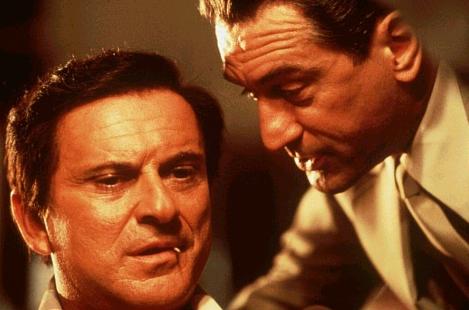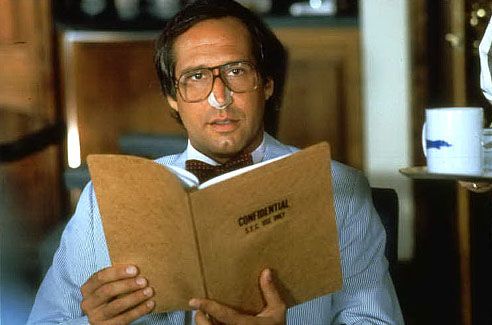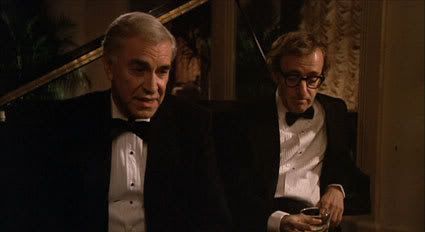Kevin's Favorite 25 Movies: 15-11

Heat is one of the all time great action films. If Martin Scorsese is the master of the East coast crime saga, then Michael Mann certainly can be called the master of the West coast crime saga. In what is his most fascinating and technically impressive film, Mann gets two giant actors to come together on screen for the first time ever in a clash of noble policeman and noble criminal. It's really one of the last times either Al Pacino or Robert DeNiro were any good and they play each character to perfection. Of course by now everyone has certainly seen the famous 'sit down' scene where the two iconic actors share screen time for the first time ever.
It's not just that these two great actors are playing this scene, and their characters, to perfection, it's the fact that they succeed in making stock characters (the out of control cop and the suave criminal) interesting again. Credit has to go to DeNiro and Pacino for this, but also to writer/director Mann who is always interested in the softer side of the male who inhabits a world of violence. Look at any Michael Mann film, whether it be the sympathetic killer in Manhunter, the crook who wants out in Thief, the philosophical hitman in Collateral, the emotional Mohican surrounded by a bloody wilderness in Last of the Mohican's, or the strictly platonic (maybe) relationship between Crocket and Tubbs in Miami Vice. Whatever film it may be Mann has a distinct style and a distinct way of directing the male characters in his movie; and no movie is more male than Heat.
It's not just an action film with brilliant shoot out scenes, but also a character study of the types of men that live these lives and the choices they must make. For example, Val Kilmer's character is doomed throughout by his relationship with Ashley Judd, he constantly is costing the group of criminals (headed up by DeNiro) some kind of anonymity. But what happens when Kilmer's character screws up and his girlfriend kicks him out? He stays with DeNiro, who lectures him on how this will hurt their next job, but sympathizes with him anyway, because he has never felt what Kilmer describes (DeNiro's speech about what an old mentor of his said about being able to walk away, is brilliant). It is this longing and loneliness that separate Heat from your standard crime film. Sure, the action is exciting and exact and sometimes thrilling, but it always heightened because of the amount of time and effort Mann and his actors have put into making these generic crime characters three dimensional. And I haven't even gotten into how good looking the movie is...seriously, Michael Mann is almost always unmatched in American cinema when it comes to visual flare. See all of his movies.

Charlie Chaplin's City Lights was my favorite film all through High School. It has dropped some on this list simply for the fact that I have seen more and more films since then. But it's power and beauty still resonate with me. It's a film where you will laugh and laugh and laugh (loudly I might add) and then you will weep and weep and weep. A feat that only Chaplin could really pull off. As is evident in the scene above (the last scene of the film) Chaplin knew how to tug at the heart strings with his pantomime. It's a beautiful thing to watch, and really there is rarely another film that will consistently make me tear up by the end.
City Lights is essentially the greatest romantic comedy ever made. The film is about Chaplin's classic character the Tramp down on his luck (as always) and wandering the streets. He happens upon a beautiful flower girl who he learns is blind. They make conversation and hit it off, but when a wealthy man gets in his car outside of where they are talking, the blind flower girl thinks that the Tramp has left. And this is the very simple (although not for Chaplin, he agonized over this scene of mistaken identity for days) set up for what is the greatest silent film ever made. If you are not familiar with Chaplin's work than I highly recommend you start with City Lights. It's classic Chaplin comedy (the boxing sequence is still one of the funniest things I have ever seen) and a wonderful example of how you don't necessarily mind being sentimentally and emotionally manipulated by a director when the manipulation is done so well. Just a great classic American film.

If you appreciate editing in movies, then this is the film for you. Holy crap this must have been a nightmare for dual editors Joe Hutshing and Pietro Scalia. Director Oliver Stone throws every trick he has into this film: archival footage, different lenses, high-key lighting, black and white film, 16mm, and a loose canon style that gives the film its much needed maddening pace and feel. It's one of my all time favorite films as I was hypnotized by Stone's "study" of the assassination of John F. Kennedy at a very young age. When the film came out on video in 1992 I watched the film almost every other weekend. I couldn't quite put my finger on it at such a young age, but every scene felt so fresh and alive with it's kinetic editing and different shooting techniques, I was totally enthralled by the picture. The film clocks in well over three hours, but it never feels that long as you are totally enthralled by the details of the investigation.
It's one of the greatest procedural films ever made, and even if you no interest in the conspiracy theories or Oliver Stone's films, you should still see this movie for its epic scale. It's not just the editing that's the amazing feat -- although it is the star of the film, just watch the opening credits and then watch the clip above, yes the acting is good, but the pacing of that scene is perfect. It's an intense scene based solely off of archival footage and oddly shot scenes in grainy 16mm and silhouette -- the cast is amazing as well.
Stone assembled a brilliant cast of supporting characters, a plethora of skilled veterans and character actors ranging from: Tommy Lee Jones, Kevin Bacon, Gary Oldman, Michael Rooker(!), Jack Lemmon, Laurie Metcalf, Sissy Spacek, Joe Pesci, John Candy, Jay O. Sanders, Walter Matthau, Sally Kirkland, Donald Sutherland, Ed Asner, Brian Doyle-Murray, Vincent D'Onofrio, and Wayne Knight (his name is even Newman in the movie). Whew! Okay, so the entire supporting cast is amazing, but this is really Kevin Costner's show amongst the actors, as they surround him with great performances he is more than up to the task. Never before or since has he been as good as he was in JFK. The final monologue at the end in the courtroom is as an amazing piece of acting as you are likely to see. It's a long speech, and Costner nails it, making us care and making us realize that when he isn't directing himself, he's a pretty good actor. For it's insane editing (that Stone would make even crazier with his next two films the very good Nixon and brilliant Natural Born Killers) and the amazing acting by Costner and the entire supporting cast, Stone has never made a movie as interesting or engrossing as JFK. If you liked All the President's Men, The Insider, and Zodiac, then you need to see JFK, the best procedural film ever made.

I need not say much about this film, it can do its own talking...seriously, just watch the clip above. For all of the great actors and the competent director James Foley, the film belongs to the words penned by David Mamet. The man is a genius. A writer who requires certain actors say his words. They have a beat or rhythm to them, and he can write profanity like no one else. Glengary Glen Ross is so funny in its creative use of profanity and dialogue, that sometimes you forget just how good it works as a unconventional Noir film. All of the elements of the Noir are here in James Foley's film and he has a wonderful cast to help him translate Mamet's play from the stage to the screen. The best scene of the movie is the clip I posted above, it almost has become a part of pop culture now (thanks to the Simpson's) and is the cliche for any kind of business or corporate moitvational speech. Ed Harris and Al Pacino are the loudest ones in the movie, and because of that they get the most laughs (although it's when Pacino is quiet and talking to Jonathan Pryce in the bar that he gets his best monologue in). But notice the quiet desperation of two very sad characters: Shelly 'the machine' Levine (Jack Lemmon in what may be his finest performance) and the fumbling George (hilariously played Alan Arkin), these losers are exactly the kind of desperate, down-on-your-luck type characters you come to expect from a Noir film.
There are so many great scenes, scenes I won't ruin by explaining them away...so do yourself a favor and see this movie. It's a perfect example of a movie where the dialogue drives the action. It has some hilariously pathetic characters, and just some plain pathetic characters (Lemmon's performance as Shelly Levine is like something Ricky Gervais would think up; brutally awkward yet you cannot look away). It's also one of the most quotable movies you will ever see. Every now and then I find myself, for no apparent reason, saying things like "yes, boots!" Or, "have you made your decision for Christ!" You may be scratching your head after reading those two quotes, so really the best thing for you to do is to make some time for yourself this week and watch Glengary Glen Ross.

Good 'ol Robocop. I feel a certain affinity towards this film. I don't remember how old I was when I watched it (that is to say, how young I was), but I have fond memories of this brutal and violent movie growing up; I always joke around that this film was my favorite babysitter growing up. The movie is a masterpiece of violence. It plays stupid with cardboard cutout good guys and bad guys shooting up the streets in the fight for territorial supremacy. The territory is futuristic Detroit (see because Detroit in the 80's was like Oakland today) and it's a bad place to be if you're a cop. The plot leads us down some familiar territory, but really, is the story going to surprise anyone at this point? It's in the action and the violence that this movie (still) shocks and surprises.
When I was younger I couldn't believe the amount of violence in this movie, and later on in life when I was in college, I bought the X-rated directors cut on Criterion DVD, and it became even more of a favorite. At this point in my life though I didn't just enjoy it because it was an awesome blood-soaked futuristic action movie. No, now I was old enough to see what made the film so great. See, not only is it an enjoyable campy sci-fi action film (like most of Verhoeven's work, see Total Recall and Starship Troopers), but I began to recognize how the film doubles as a wrly comic vision of a dystopia run amok by the postmodern and cyberpunk imagery that was so popular at the time. The film can play dumb (if you look at it on its surface) or it can play smart (dig a little deeper and you'll see the humor), either way you get a great movie.
It's a pivotal sci-fi movie as it introduced some state of the art special effects , and to a lesser degree, explored the human/robot (android) dichotomy. Wait...what? Oh yeah, and it rules because there is a guy who is covered in toxic waste and is hit by a car, Ed-209, the dad from That 70's Show is the head villain, and the movie just revels in how blood thirsty it is. Yes, you can take a serious look at the film and some of its postmodern imagery, and I have no doubts that director Verhoeven had some of those ideas in mind when he was making the film. But man, as a pure action film from my youth...this movie rules and will always be one of my favorites. I am sure Troy will have it much higher on his list, after all, he introduced me to it. What a great big brother eh? Oh and for those of you wondering just how the picture above pertains to Robocop...all I can answer with is...I'll buy that for a dollar!














































